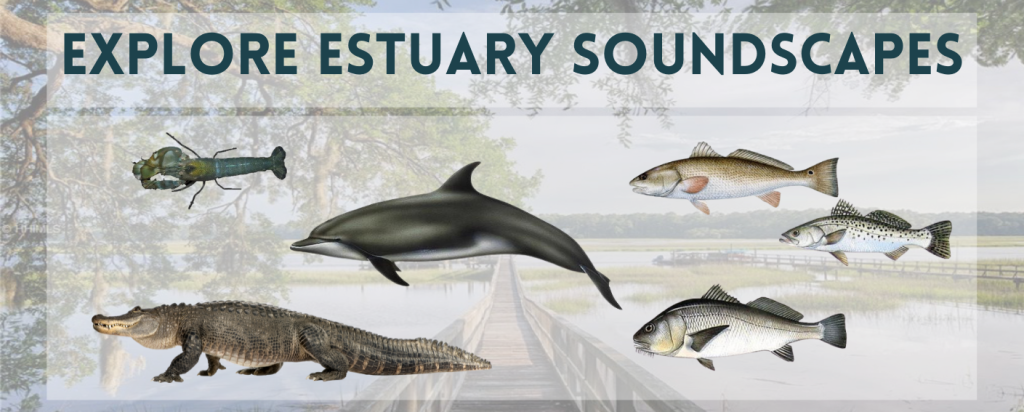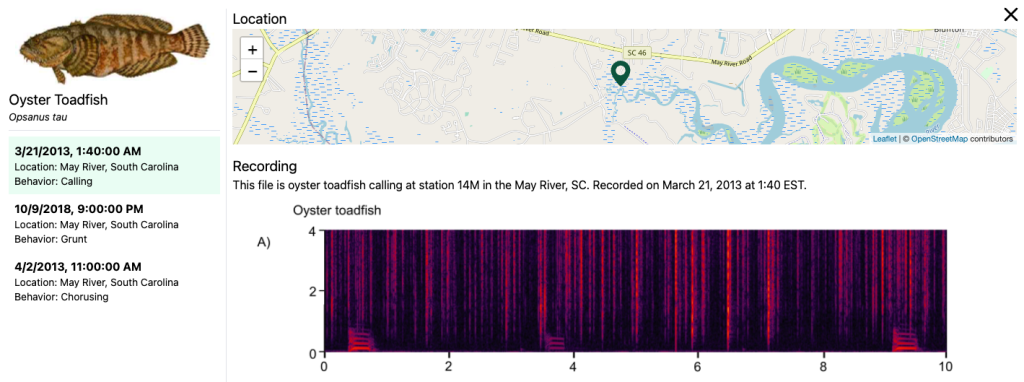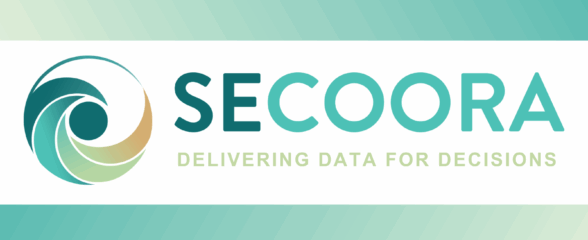
Ever wonder what a bottlenose dolphin sounds like when whistling? Or what a manatee call sounds like? A new SECOORA webpage allows you to listen to a variety of marine animal sounds – including bottlenose dolphin – from South Carolina.
These sounds are captured by passive acoustic recorders deployed by Dr. Eric Montie and his team from the University of South Carolina Beaufort. Passive acoustic recorders allow continuous and long-term sampling of the underwater soundscape. These recordings provide information on the behavior of marine life and noise levels associated with human activity.
Access the Data
The new sound webpage is easy to use. Click on a species and select a timeframe to hear the species’ behavior. For example, you can listen to an Oyster Toadfish and hear the behavior of calling, grunting, or chorusing at different times.

Below are the species sounds available to “hear”:
- American Alligator – Alligator mississippiensis
- Snapping Shrimp – Genus Alpheus and Synalpheus
- Oyster Toadfish – Opsanus tau
- Right Whale – Eubalaena glacialis
- Bottlenose Dolphin – Tursiops truncatus
- Atlantic Croaker – Micropogonias undulatus
- Black Drum – Pogonias cromis
- Red Drum – Sciaenops ocellatus
- Silver Perch – Bairdiella chrysoura
- Spotted Seatrout – Cynoscion nebulosus
- Weakfish – Cynoscion regalis
- Manatee – Trichechus manatus
Why collect sound data?
The long-term goal is to ‘eavesdrop’ on key behaviors of marine animals that can change rapidly or gradually in response to environmental changes and human impacts. Sound can provide a measure of resilience or shifting baselines in a globally changing environment.
Information is used to understand animal responses or resilience to various stressors such as vessel noise, underwater construction, chemical pollution, harmful algal blooms, extreme weather events like hurricanes and floods, and long-term impacts related to climate change.
Related news

Plankton Perfect: Using Imagery to Document Microscopic Marine Life
Dr. Enrique Montes is working to understand how plankton respond to changes in the ocean by capturing high resolution imagery with advanced technology. This work is funded by the Marine Biodiversity Observation Network (MBON) to use novel techniques like the Continuous Particle Imaging and Classification System (CPICS).

SECOORA Community Spotlight: Craig Harris
When Craig Harris signed on as the Emergency Management and Resiliency Coordinator for the city of Wilmington, North Carolina, he brought with him knowledge of water level sensors. SECOORA worked with Craig to install a water level sensor at the Love Grove Bridge in Wilmington, a site prone to flooding.

SECOORA Funding Opportunity Announcement: Letters of Intent Solicitation
SECOORA will submit a coordinated regional proposal in response to the anticipated FY 2026 Implementation of the U.S. Integrated Ocean Observing System (IOOS) funding opportunity. Letters of Intent to be considered for inclusion in SECOORA’s full proposal are due September 9, 2025.